#sebastian junger
Explore tagged Tumblr posts
Text
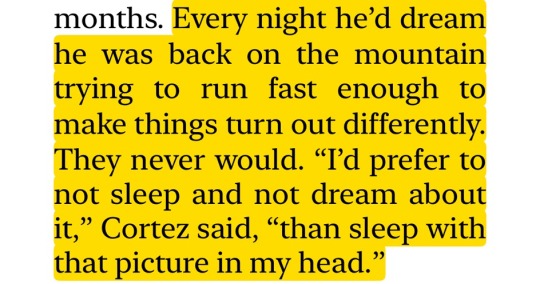
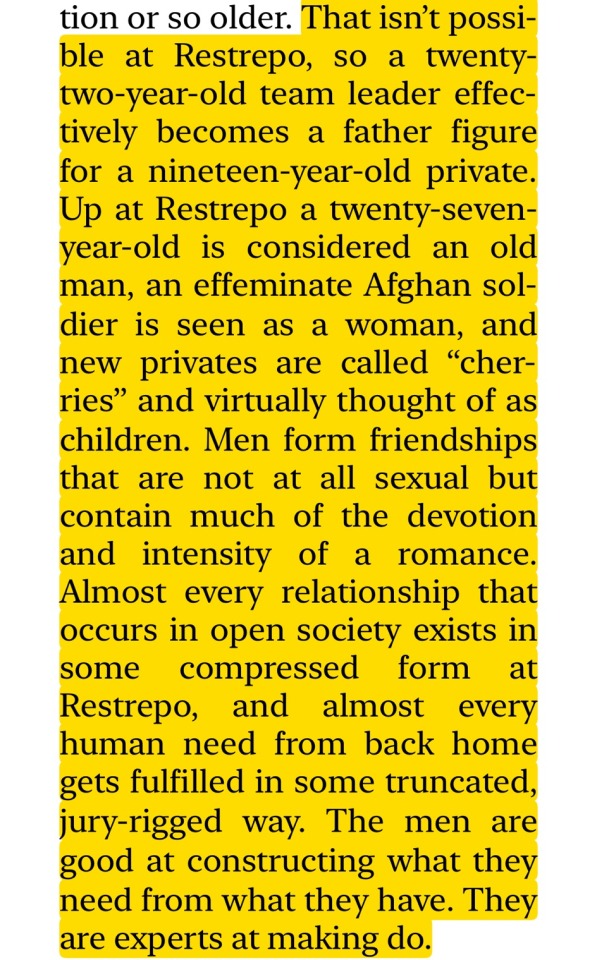

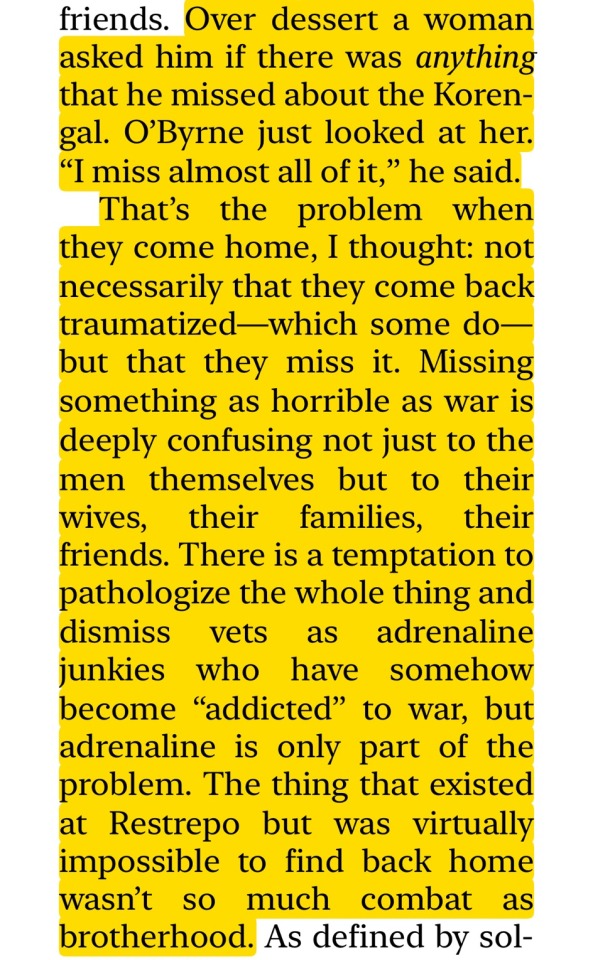
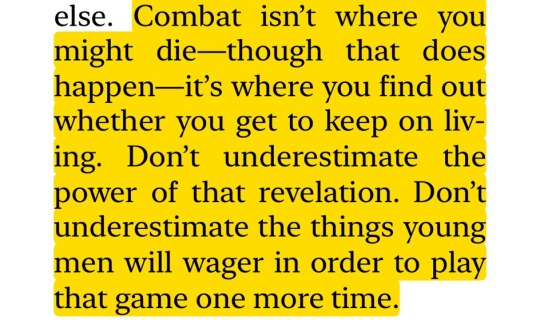
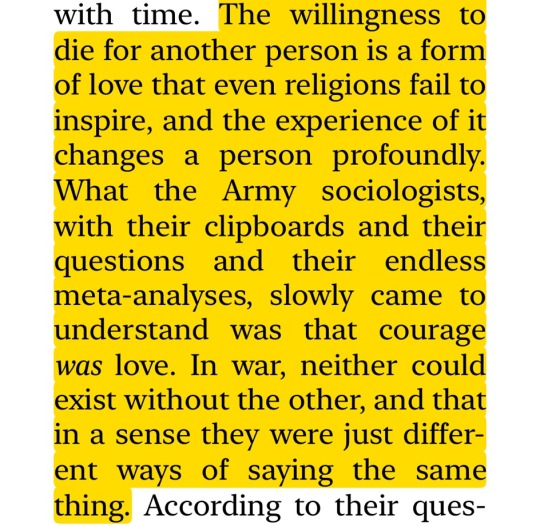
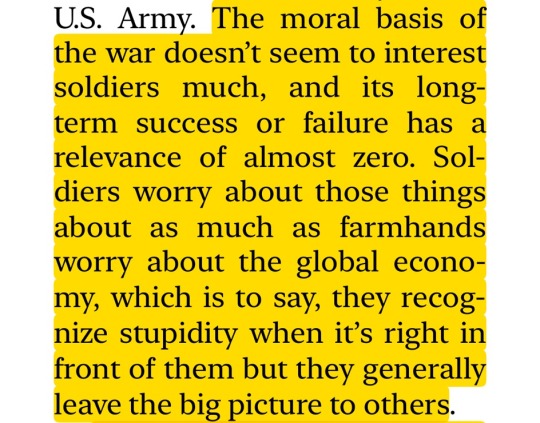
interesting quotes from war by sebastian junger
#sebastian junger#war#nat posting#read for video essay research#i really want to compare this book to generation kill#both are written by journalists#generation kill#hbo war#the documentaries could also be compared to gen kill#lot to think about#war in afghanistan#iraq war#america#anti war
8 notes
·
View notes
Text
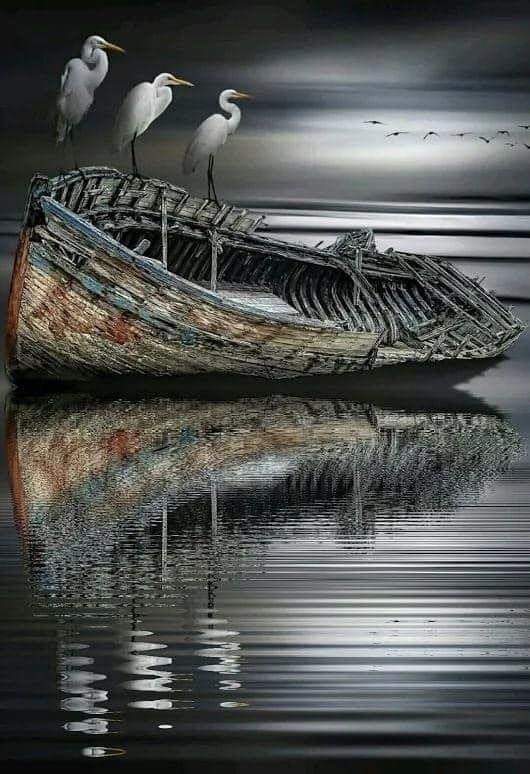
“How do men act on a sinking ship? Do they hold each other? Do they pass around the whisky? Do they cry?” By Sebastian Junger, The perfect storm
114 notes
·
View notes
Text
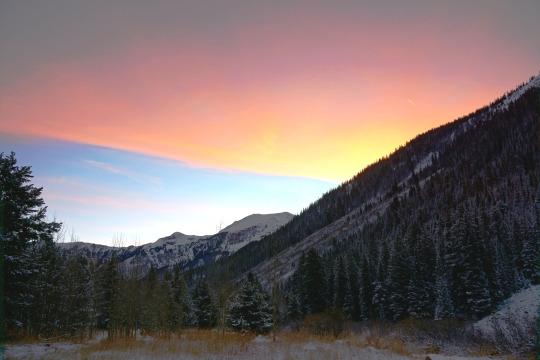
"Death isn't the end of life; it's like turning off a lamp because morning has arrived."
~Sebastian Junger
(Photo © dramoor 2015 Maroon Bells Wilderness Area, Colorado)
#sunrise#sky#Rocky Mountains#Maroon Bells#wilderness#morning#photography#photographers on tumblr#Colorado#travel#death is not the end of life#Sebastian Junger
21 notes
·
View notes
Text
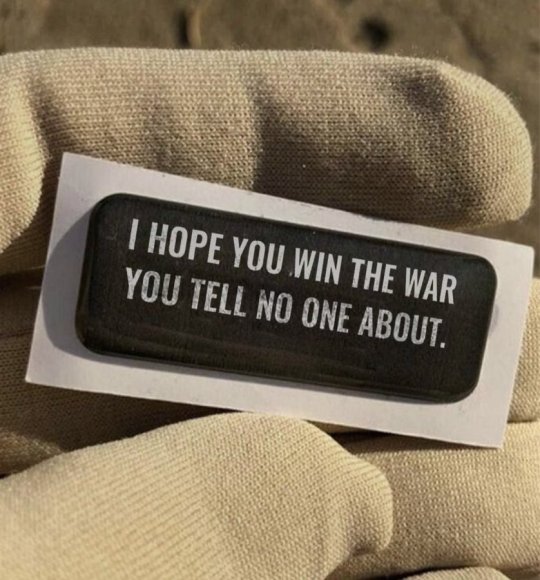
Today's veterans often come home to find that, although they're willing to die for their country, they're not sure how to live for it.
Sebastian Junger, Tribe: On Homecoming and Belonging
Dedicated to my fellow veterans on this Armed Forces Week.
May you win the war you brought home with you.
Dum spiro spero (while I breathe, I hope).
#junger#sebastian junger#quote#veterans#british army#PTSD#homecoming#belonging#soldier#sufering#war#purpose#healing#armed forces week 2023
106 notes
·
View notes
Text
Our insignificance alongside so much energy even started to feel like its own form of freedom until we realized that everything we needed—food, clothes, gear—came from the very thing we thought we were outwitting. If subsistence-level survival were the standard for absolute freedom, the word would mean nothing because virtually no one could pass that test. People love to believe they’re free, though, which is hard to achieve in a society that has outsourced virtually all of the tasks needed for survival. Few people grow their own food or build their own homes, and no one—literally no one—refines their own gasoline, performs their own surgery, makes their own ball bearings, grinds their own eyeglass lenses, or manufactures their own electronics from scratch. Everyone—including people who vehemently oppose any form of federal government—depend on a sprawling supply chain that can only function with federal oversight, and most of them pay roughly one-third of their income in taxes for the right to participate in this system.
— Freedom by Sebastian Junger
6 notes
·
View notes
Text

2 notes
·
View notes
Text
Mike Vargo: Bad Religion, Good Religion
Trying to grasp how the world works is, literally, a trying occupation. For years I pursued it as a journalist, studying the actions of the great and the ungreat. These days, the only official “reporting” I do is occasionally reviewing live theater. The plays are scripted simulations of real life and I get to hear incisive, memorable lines spoken on stage. But one of the best lines came…
#agnosticism#atheism#Buddhism#Catholic Church#Christianity#Deist#enlightenment#God#Hinduism#Islam#judaism#Karl Marx#Mike Vargo#morality#Protestanti#Sebastian Junger
1 note
·
View note
Text
Near-death experience
What they found was that in the 30 seconds before and after the moment of death — and of course death isn't just confined to a single moment, it's a spectrum — there was a surge in brain activity related to dreaming and memories and all kinds of other things.
So one of the things that might happen when people die is that they experience this flood of sensations from their life. Why would they? Who knows? It's hard to come up with this Darwinian reason for why this might be adaptive when a person’s dying. It's not a question of survival and procreation, and Darwinism is not concerned with emotional comfort. It just doesn't matter in the Darwinian arithmetic, so it's hard to know what to make of it.
https://www.vox.com/the-gray-area/351128/the-science-of-near-death-experiences
0 notes
Text
Just a Question: Are You A Completionist? For Which Writers?
#bookworm#literature#book reviews#read read read#books#just a question#quirky#ask me anything#haruki murakami#ralph ellison#franz kafka#arthur c clarke#j m coetzee#sebastian junger
0 notes
Text
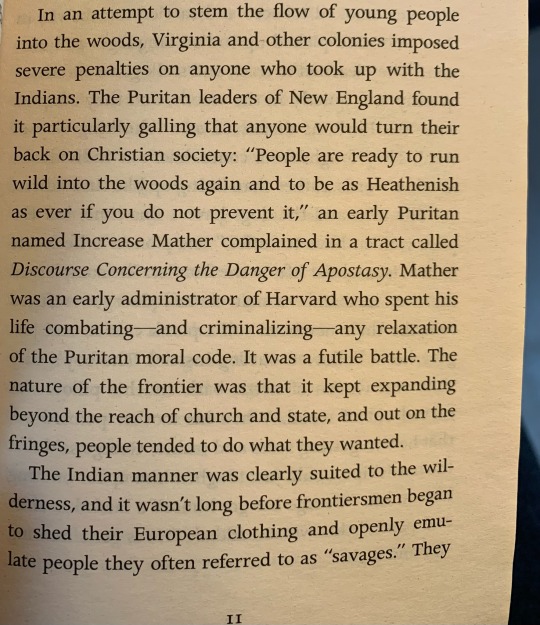
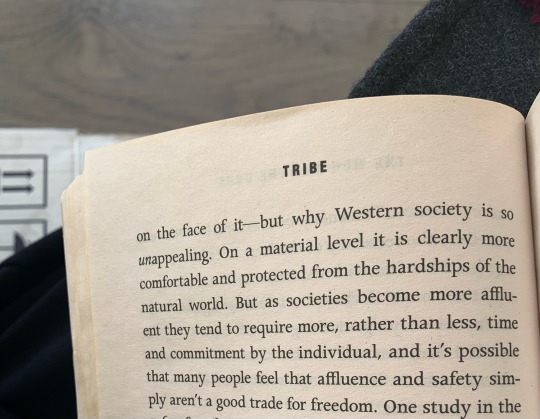
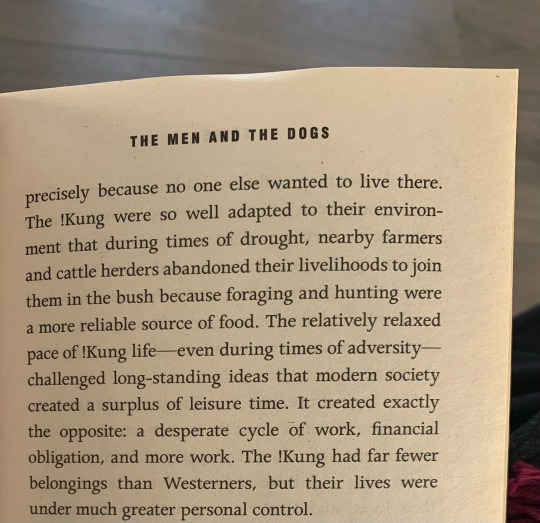
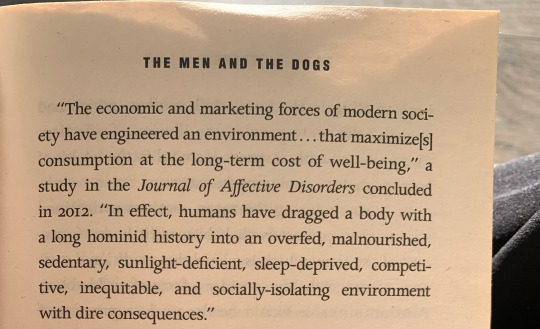
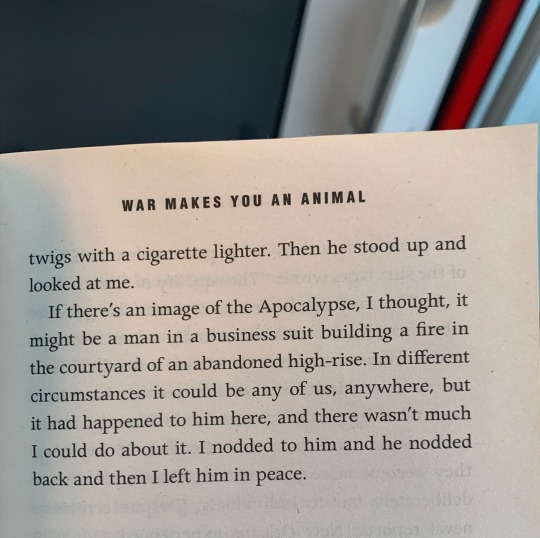
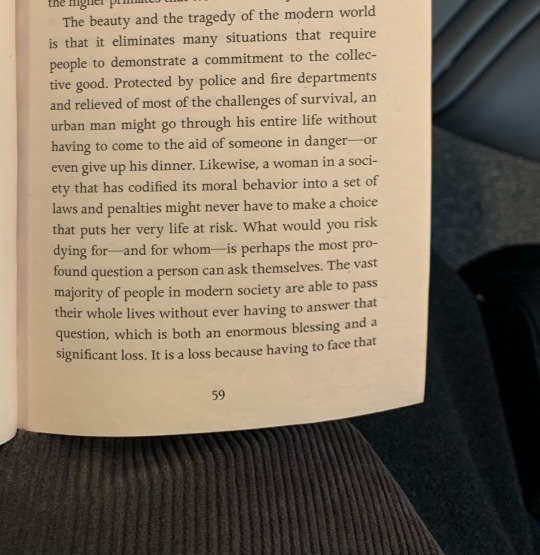

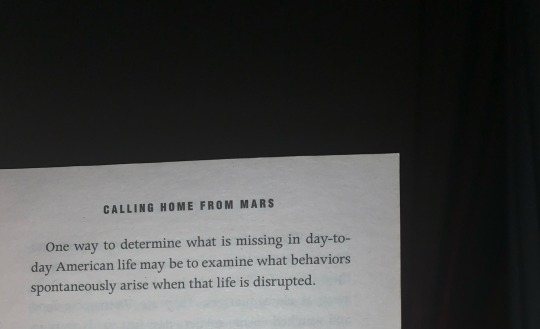
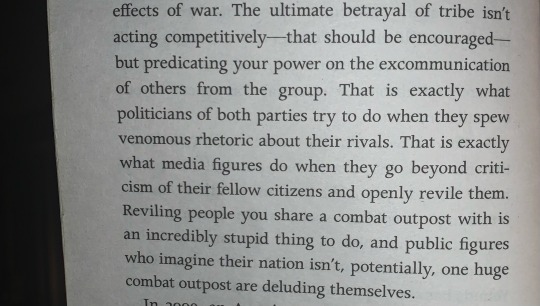
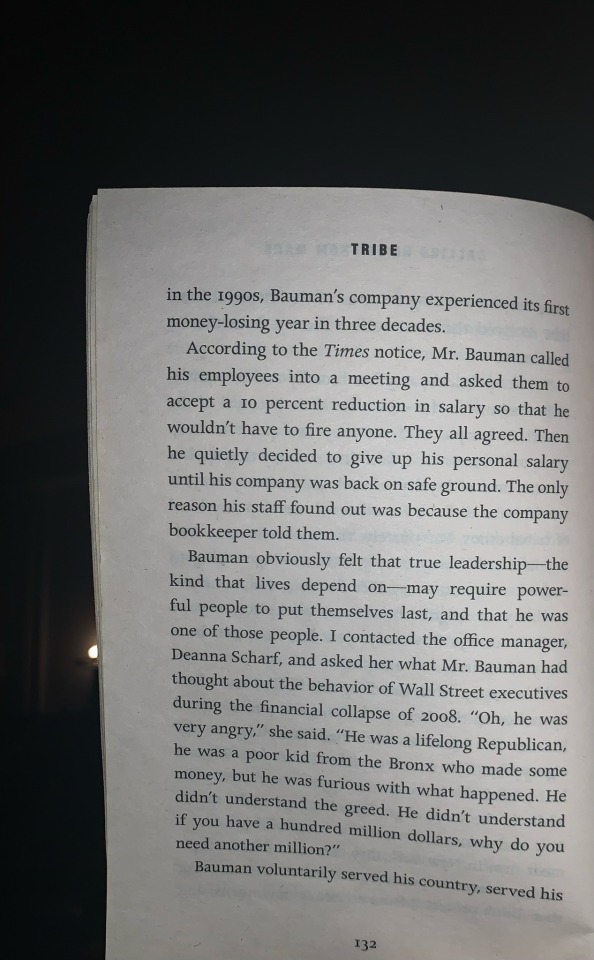
excerpten uit Tribe van Sebastian Junger
ja lezen
0 notes
Text
have to read greek plays to understand girard have to read sarrasine to understand barthes learning takes so much effort sob
#finally read the Bacchae and now going on to Medea#the only lit critic/theorist I am understanding atm is northrop frye <3#I wish I studied some lit in university but alas I did not#I had a political science prof (a religion x war expert) who assigned us some lit fic (Things They Carried and Killer Angels) but that's it#Oh also some Sebastian Junger but I think that was journalism not lit fic.#I read TTTC in hs (one of my fave books) and didn't even do the Killer Angels assignment so like w/e.
3 notes
·
View notes
Text
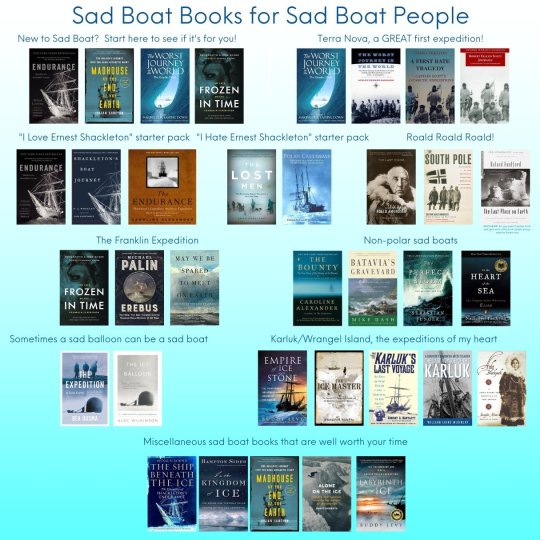
I guess it's time to start moving some content from twt over here! For those who don't know me, I'm a public librarian with a special interest in polar and nautical history, and I love nothing more than connecting readers with good books. I've managed to convert some friends to my way of thinking, and one of them coined the phrase "sad boat books" to describe the types of books that I'm always reading and recommending. Here is my first list of sad boat books-- I can personally vouch for all of them!
New to sad boat? Start here to see if it’s for you!
Endurance by Alfred Lansing
Madhouse at the End of the Earth by Julian Sancton
The Worst Journey in the World- The Graphic Novel Volume 1: Making Our Easting Down adapted by Sarah Airriess from the book by Apsley Cherry-Garrard
Frozen in Time: The Fate of the Franklin Expedition by Owen Beattie and John Geiger
Terra Nova, A GREAT first expedition!
The Worst Journey in the World- The Graphic Novel Volume 1: Making Our Easting Down adapted by Sarah Airriess from the book by Apsley Cherry-Garrard
The Worst Journey in the World by Apsley Cherry-Garrard
A First Rate Tragedy by Diana Preston
Robert Falcon Scott Journals- Captain Scott’s Last Expedition by Robert Falcon Scott
“I Love Ernest Shackleton” starter pack
Endurance by Alfred Lansing
Shackleton’s Boat Journey by Frank Worsley
The Endurance by Caroline Alexander
“I Hate Ernest Shackleton” starter pack
The Lost Men by Kelly Tyler-Lewis
Polar Castaways by Richard McElrea and David Harrowfield
Roald Roald Roald!
The Last Viking: The Life of Roald Amundsen by Stephen Bown
The South Pole by Roald Amundsen
The Last Place on Earth by Roland Huntford*
*DISCLAIMER: this guy hates Captain Scott and gets most of the Scott details wrong, read for Roald only!
The Franklin Expedition
Frozen in Time: The Fate of the Franklin Expedition by Owen Beattie and John Geiger
Erebus by Michael Palin
May We Be Spared to Meet on Earth: Letters of the Lost Franklin Expedition edited by Russell A. Potter, Regina Koellner, Peter Carney, and Mary Williamson
Non-polar sad boats
The Bounty by Caroline Alexander
Batavia’s Graveyard by Mike Dash
The Perfect Storm by Sebastian Junger
In The Heart of the Sea by Nathaniel Philbrick
Sometimes a sad balloon can be a sad boat
The Expedition by Bea Uusma
The Ice Balloon by Alec Wilkinson
Karluk/Wrangel Island, the expeditions of my heart
Empire of Ice and Stone: The Disastrous and Heroic Voyage of the Karluk by Buddy Levy
The Ice Master by Jennifer Niven
The Karluk’s Last Voyage by Robert A. Bartlett
The Last Voyage of the Karluk: A Survivor’s Memoir of Arctic Disaster by William Laird McKinlay
Ada Blackjack: A True Story of Survival in the Arctic by Jennifer Niven
Miscellaneous sad boat books that are well worth your time
The Ship Beneath the Ice: The Discovery of Shackleton’s Endurance by Mensun Bound
In The Kingdom of Ice: The Grand and Terrible Polar Voyage of the USS Jeannette by Hampton Sides
Madhouse at the End of the Earth by Julian Sancton
Alone on the Ice: The Greatest Survival Story in the History of Exploration by David Roberts
Labyrinth of Ice: The Triumphant and Tragic Greely Polar Expedition by Buddy Levy
If you read and enjoy any of these, please let me know!
2K notes
·
View notes
Text
wie kann’s eigentlich sein dass robert karow in jedem tatort shirtless durch die gegend rennt und selbst sebastian bootz schon oben ohne unterwegs war aber wir in sechs episoden spatort noch nie leo hölzer oberkörperfrei gesehen haben obwohl vladi gebaut ist wie ein junger gott
#weil adam dann spontanen herztod stirbt?#ist es weil die einschaltquoten explodieren würden?#überlastung des deutschen fernsehens?#müssten die dann die gez erhöhen?#robert karow#sebastian bootz#leo hölzer
84 notes
·
View notes
Text
“The willness to die for another person is a form of love that even religions fail to inspire, and the experience of it changes a person profoundly. What the army sociologists, with their clipboards and their questions, and their endless meta analyses, slowly came to understand was that courage was love. In war neither could exist without the other, and that in a sense, they were just different ways of saying the same thing.” - from War by Sebastian Junger
“the willingness to die for another person is a form of love.” i want to question that for a second because are you really willing to die for them, or is it just what you would have done anyway? when you're in that position of living with somebody and understanding somebody to a degree that nobody else can, that is a form of love. but the willingness to die part, is it yourself who wants that or is it the pure collective removal of your individualism, of your personhood? because the army strips you of that. you are not yourself. you are there to serve your fellow soldiers, your country, you're not there to serve yourself. all of your selflessness is gone. you would rather sacrifice your life for the guy next to you than to save yourself, because that's what you’re primed to do that's what you're there for. so is that really love or is that just what you would have done anyway? because you’re brainwashed into doing so?
“courage was love.” but is it really courage? and is it really love if it's just saving the guy next to you? would you love this person, would you take that risk or do this if you weren't in this war zone? definitely not. you probably would hate the guy next to you in real life. but you're in this life or death survival situation. they have this deep devotion to each other, you form this brotherhood and then it's addictive and you want to keep it because you don't have a relationship like this anywhere else.
it's really interesting to think about whether love has anything to do with agency, and i know people will say, oh, you don't really control who you love. that's true. but, are they really allowed to love or are they taught to love?
#generation kill#hbo war#video essay stuff#restrepo#korengal#from my video essay transcript#i made a point so good i had to post it#courage was love#all is fair in love and war#iraq war#war in afghanistan#nat posting#my thoughts#band of brothers#the pacific#i thought about that line from gun. by mcr#they’re teaching me to kill who’s teaching me to love?
27 notes
·
View notes
Text
For most of human history, freedom had to be at least suffered for, if not died for, and that raised its value to something almost sacred. In modern democracies, however, an ethos of public sacrifice is rarely needed because freedom and survival are more or less guaranteed. That is a great blessing but allows people to believe that any sacrifice at all—rationing water during a drought, for example—are forms of government tyranny.
— Freedom by Sebastian Junger
3 notes
·
View notes
